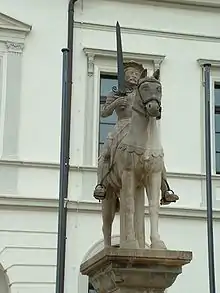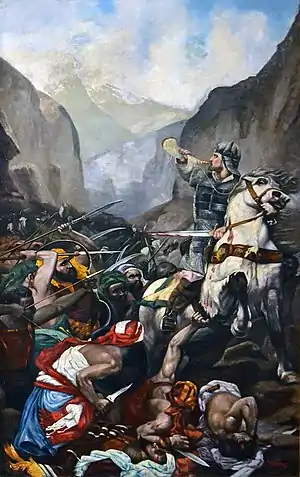Veillantif
Veillantif (French), Vielantiu (Old French); Vegliantin, Vegliantino or Brigliadoro (Italian) is the name of Roland the paladin's trustworthy and swift steed in the stories derived from the chansons de geste. The French name comes from an expression meaning "vigilant". Veillantif is first mentioned in The Song of Roland (v. 2032; laisse 151).


Veillantif was given various origins. In the 12th century chanson de geste Aspremont, the horse is said to have formerly been in the possession of King Agolant's son Aumon. After Aumon's defeat, the horse (and his sword Durendal) was given to Roland.[1][2]
Andrea da Barberino's (1370–1431) Italian prose adaptation L'Aspramonte stated that the horse was called Briadoro when it belonged to Almonte (Aumon), but renamed Vegliantino after being conquered by Orlandino ("little Roland").[3][4][5] Luigi Pulci's (1432–1484) Morgante refers to the horse as Vegliantino whereas Matteo Maria Boiardo's (1440–1494) Orlando Innamorato and Ludovico Ariosto's (1474–1533) Orlando Furioso used "Brigliadoro", Italian for "bridle of gold".[lower-alpha 1]
See also
- Bayard, Rinaldo/Renaud's magical horse
- List of historical horses
- List of fictional horses
Explanatory notes
- Barbara Reynolds ventured that "It was Boiardo who re-named him Brigliadoro".[6]
References
- Citations
- Brandin (1919–1921), vv. 6075–80.
- Newth (1989), pp. 146–147, vv. 6075–80.
- Barberino, L'Aspramonte III (38): "..il quale da' Pagani era chiamato Briadoro, e in questo dì cambiò nome e fu chiamato da' Cristiani Vegliantino". Boni (1951), p. 151, Mattaini (1957), p. 585.
- Boni (1951), p. 370.
- Ross (2004), p. 621: notes to Orlando.
- Reynolds (1975), introduction, p. 109.
- Bibliography
- texts
- Brandin, Louis, ed. (1919), La Chanson d'Aspremont: chanson de geste du XII ̇siècle: Text du manuscrit de Wollaton Hall, vol. 1, Paris: Honoré Champion; volume 2 (1921). (in French)
- Brault, Gerard J., ed. (1978), The Song of Roland: An Analytical Edition, Pennsylvania State University. ISBN 0-271-00516-5
- Andrea da Barberino (1951), Boni, Marco (ed.), Aspramonte, romanzo cavalleresco inedito; Ed. critica con glossario, Bologna: Antiquaria Palmaverde (in Italian)
- Andrea da Barberino (1957), Mattaini, Adelaide (ed.), Romanzi dei Reali di Francia, Rizzoli (in Italian)
- translations
- Newth, Michael A. (tr. & ed.) (1989), The Song of Aspremont (La Chanson d'Aspremont, New York: Garland
- Ludovico Ariosto (1975), Reynolds, Barbara (ed.), Orlando Furioso, in two volumes, Penguin Part one (cantos 1-23) ISBN 0-14-044311-8; part two (cantos 24-46) ISBN 0-14-044310-X.
- Matteo Boiardo (2004), Ross, Charles Stanley (ed.), Orlando Inammorato: Orlando in Love, Parlor Press LLC ISBN 1932559019
- Combarieu du Grès, Micheline de, and Subrenat, Jean, ed., (1983), Les Quatre Fils Aymon, Paris: Gallimard, . ISBN 2-07-037501-3 (in French)